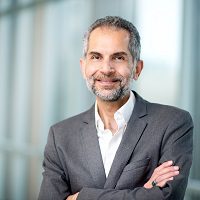Volume 35 Number 4 | August 2021
Hassan Aziz, PhD, FACSs, MLS(ASCP)CM, ASCLS President, 2021-22

The impact of the COVID-19 pandemic on our profession has been significant. Watching all this unfold has been at times heartbreaking, and at other times inspiring. Who could have imagined a pandemic of this magnitude that would not only threaten the health of millions of people but place healthcare practitioners in danger and challenge the world’s economy?
United, we must continue to advocate for adequate staffing and appropriate work conditions and facilities. We must work with public health officials to pursue policies that reduce the frequency and severity of disease and mental stress. At the same time, we must allow for the orderly and safe conduct of business and education. We must continue to let science lead us and be vocal advocates for evidence-based treatment and safe and effective vaccines.
During the pandemic, ASCLS’s value has been demonstrated. Our website was visited by thousands of people. Our members served as expert resources in the media. Whenever uncertainty and misinformation on social media was disseminated, ASCLS and its members were quick to provide unbiased clarity. In a time of great need, ASCLS proved to be the trusted leader for the profession.
“The past year has been a wake-up call … We should therefore take strategic actions to build our organization’s resilience to prepare for future disruptions.”
We should not emerge from this crisis looking like we did going in. The contagious pandemic was an opportunity to grow and learn. I hope we seize this opportunity to advocate for ourselves—not just with legislators and regulators, but with other health professionals—and demonstrate the value laboratory professionals add to create a healthier society.
We must take an active role in addressing the inequities in health and healthcare in our populations. The COVID-19 pandemic has made the intersection of health inequities and chronic disease even more apparent. Those already experiencing health inequity are often those with chronic illnesses who are also at increased risk for COVID-19.
Another area that needs our continued attention is our advocacy in diversity, equity, and inclusion. We respect the inherent dignity and rights of all individuals. We are against discrimination and aspire to address health disparities. However, we must live those values through action. That means making strategic investments to support diversity, equity, and inclusion. That means listening and learning and doing whatever it takes to ensure that as a profession and a Society, no one feels like an outsider. This may be one of our most difficult challenges because addressing this topic rests squarely on our shoulders. We cannot delegate it or relegate it to others. The ultimate decision on what our profession stands for is ours alone to make.
Last year when I announced my candidacy, I emphasized the importance of “resiliency.” I talked about the three stages of a crisis:
- Respond, in which we deal with the present situation and manage continuity.
- Recover, during which we learn and emerge stronger.
- Thrive, where we prepare for and shape the “next normal.”
As the 2021-22 president of ASCLS, I plan to take tactical steps for ASCLS to thrive. A resilient organization is not one that is simply able to return to where it left off before the crisis. Truly resilient organizations transform, build attitudes, beliefs, agility, and structures into their core missions and operations that enable them to not just recover to where they were but to leap forward.
The past year has been a wake-up call. We now know what can happen and how quickly it can unfold. We understand how something like a virus, or a significant climate event, can dramatically affect communities. These issues and their potential impacts are no longer hypothetical. We should therefore take strategic actions to build our organization’s resilience to prepare for future disruptions.
Effective organizational resilience strategies require the management of two core dimensions.
First: Defensive vs. Progressive Mindsets
With a defensive mindset, organizations focus on threats and risks. The primary concern is to stop bad things from happening to the organization.
With a progressive mindset, organizations focus on prospects and opportunities. The primary concern is to make good things happen for the organization.
Second: Consistency vs. Flexibility
A consistent approach is characterized by formalizing goals, values, and behaviors and the standardization of rules, procedures, systems, guidelines, and policies. Consistency can lead to efficiency gain, especially during disruptive times.
A flexible approach is characterized by a diversity of perspectives, ideas, and work practices. Flexibility can lead to originality and innovation and help the organization solve and adapt, particularly in a crisis.
These two dimensions form an integral part of a framework that highlights four common strategies for achieving organizational resilience. Responding to COVID-19 will require us to be both defensive AND progressive, as well as consistent AND flexible. There is no single recipe, but we will need to balance all four core strategies for ASCLS to be truly resilient. Crises with profound challenges to navigate will lead to opportunities for learning and deepening trust with all stakeholders while equipping ASCLS for a step change that creates more value for the Society.
I’ll end with a quote from Muhammed Ali. He was the greatest heavyweight boxer of a generation and remains one of the most admired sportspeople of all time. Ali famously said, “Don’t count the days; make the days count.” Even when he faced a Parkinson’s diagnosis later in life, he did so with great integrity. Like Ali and all risk-takes, we should be courageous and brave; sometimes events don’t unfold as we hoped. But through a non-compromising approach, paired with a positive mindset, we can remain focused on what is needed to achieve success.
I look forward to working on your behalf during my term as president to promote ASCLS and the profession.
Hassan Aziz is Dean of the College of Nursing and Health Sciences at Texas A&M University-Corpus Christi.